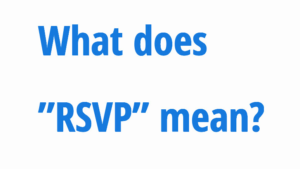A Guide: RSVP Meaning and Usage
Have you ever received an invitation to an event, whether it’s a wedding, a birthday party, or a corporate gathering, and seen those four little letters: RSVP? If you have, you might have wondered what exactly they mean and what you’re supposed to do next. Well, you’re in the right place! This comprehensive guide will dive deep into the RSVP Meaning and usage, so you’ll never be left scratching your head again.
What is RSVP Meaning?
Understanding the Acronym RSVP
Let’s start with the basics. RSVP stands for the French phrase “Répondez s’il vous plaît,” which translates to “Please respond” in English. It’s a polite request for you to let the host know whether or not you’ll be attending their event.
The Importance of RSVP
Why is RSVP so important? Imagine planning a party without knowing how many guests will attend. You could end up with too much food, not enough chairs, or worse, you might not have enough space for everyone. By RSVPing, you’re helping the host plan the event more efficiently and ensuring everything runs smoothly.
When to RSVP
Timing Is Everything
Knowing when to RSVP is crucial. Generally, you should respond as soon as possible, ideally within a week of receiving the invitation. This shows respect for the host’s planning efforts and gives them enough time to make any necessary arrangements.
Last-Minute Changes
What if something comes up after you’ve already RSVP’d? Life happens, and plans can change. If you need to change your RSVP status, do so as soon as possible. Contact the host directly and explain the situation. They’ll appreciate your honesty and the advance notice.
How to Use RSVP Meaning
Methods of Responding
In today’s digital age, there are several ways you might be asked to RSVP:
Traditional Mail
If you receive a formal invitation by mail, it often includes a response card. Fill it out and mail it back by the specified date.
Some invitations might request an email response. Make sure your reply is clear and includes all necessary details, such as whether you’ll be bringing a guest.
Online RSVP
Many events now use websites or social media for RSVPs. Follow the provided link and fill out the online form. This method is quick and ensures your response is recorded accurately.
Phone Call or Text
For more casual events, a phone call or text message might be acceptable. Just make sure to confirm with the host that they’ve received your response.
RSVP Etiquette
Being a Considerate Guest
Responding to an RSVP isn’t just about saying yes or no. It’s also about being considerate of the host and other guests. Here are some tips on RSVP etiquette:
Respond Promptly
Don’t leave the host hanging. Respond as soon as you know your availability. This gives the host the opportunity to finalise their guest list and make any required preparations.
Be Honest
If you’re unsure whether you can attend, it’s better to decline and let the host know you can’t commit. If your plans change and you’re able to attend after all, you can always check with the host to see if there’s still room.
Include All Requested Information
When RSVPing, provide all the information the host has asked for. This might include the names of all attendees in your party or any dietary restrictions.
Respect the Deadline
RSVP deadlines are set for a reason. Make sure to respond by the specified date to help the host with their planning.
Common RSVP Mistakes
Avoiding Pitfalls
Even with the best intentions, it’s easy to make mistakes when it comes to RSVPing. The following typical traps should be avoided:
Ignoring the RSVP
One of the biggest faux pas is ignoring the RSVP altogether. Even if you can’t attend, it’s polite to let the host know.
Bringing Uninvited Guests
If your invitation doesn’t specify a plus-one or family members, don’t assume you can bring someone along. Always check with the host first.
Changing Plans Last Minute
While life is unpredictable, try to avoid changing your RSVP status at the last minute. This can cause unnecessary stress for the host.
The Host’s Perspective
Why Hosts Rely on RSVPs
From the host’s perspective, RSVPs are invaluable. They help in planning everything from seating arrangements to catering quantities. Here’s why your prompt response matters:
Budgeting
Knowing the number of attendees helps hosts budget for food, drinks, and other essentials. It ensures they don’t overspend or fall short.
Space Management
RSVPs allow hosts to arrange their space to accommodate everyone comfortably, whether it’s setting up enough chairs or ensuring the venue is the right size.
Personalized Experience
With a clear guest list, hosts can create a more personalized experience, such as crafting name cards or customizing party favors.
Cultural Differences in RSVPs
International Etiquette
RSVP practices can vary widely across different cultures. Understanding these nuances can help you navigate invitations more gracefully, no matter where you are.
Formality Levels
In some cultures, formal RSVPs are expected for even the smallest gatherings, while others might have a more relaxed approach.
Response Times
Response times can also differ. In some places, it’s customary to RSVP almost immediately, while in others, a more leisurely response is acceptable.
Communication Methods
Preferred methods of communication for RSVPs can vary. Some cultures might favor traditional mail, while others are more inclined towards digital responses.
Conclusion
In conclusion, understanding the RSVP Meaning and RSVP importance is essential for both guests and hosts. By responding promptly and respectfully, you not only make the host’s job easier but also ensure a smoother and more enjoyable event for everyone involved. So, the next time you receive an invitation with an RSVP request, you’ll know exactly what to do. Remember, it’s all about being considerate and helping to create the best possible experience for everyone. Now, go forth and RSVP like a pro!



